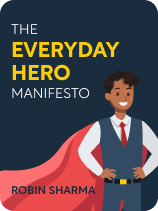

This article is an excerpt from the Shortform book guide to "The Everyday Hero Manifesto" by Robin Sharma. Shortform has the world's best summaries and analyses of books you should be reading.
Like this article? Sign up for a free trial here.
Do you want to be an everyday superhero? How can you reach your full potential?
Becoming a hero like The Everyday Hero Manifesto by Robin Sharma describes doesn’t require superpowers or extraordinary talents, but it does require work. We’ll go over Sharma’s suggestions for how to strengthen your mind, body, and heart to realize your full heroic potential.
Let’s look at how to reach your full potential to help you succeed.
Empower Your Body
Sharma says that being in good physical health will greatly boost your energy and confidence, which is crucial for someone who wants to accomplish great things. He offers two tips for how to reach your full potential by empowering your body.
Tip 1: Eat a Healthy Diet
First, Sharma recommends eating only fresh, local food, with nutritional supplements to make up for any dietary shortcomings. For example, if you live somewhere citrus fruits don’t grow, you could take vitamin C supplements to make up for that lack.
(Shortform note: Some experts say that eating locally grown food is actually healthy for you, your local economy, and the environment. This is because local foods are fresher, without the need for artificial preservatives; in fact, it’s often less than 24 hours from when local produce is harvested to when it’s bought. This is important because some studies have linked processed foods with high levels of preservatives to weight gain, cancer, heart disease, and dementia. Furthermore, buying locally means spending locally—the money goes to members of your community instead of large supermarket chains. Finally, local food doesn’t need to be transported as far, which means fewer vehicle emissions are released into the air.)
Intermittent fasting can also help strengthen your body. Periods of fasting cause your body to enter survival mode, where it focuses on repairing cellular damage and using energy efficiently. Fasting also boosts your brain function, which may enhance your productivity. Sharma says that on days he wants to be especially productive, he doesn’t eat any food until dinnertime; he subsists on coffee, tea, and plenty of water. However, he also recommends speaking to a doctor before you start any sort of intermittent fasting plan.
(Shortform note: Some scientists argue that intermittent fasting works because, after several hours without food, your body uses up the calories from your last meal and starts burning fat instead. Furthermore, some studies support Sharma’s claim that intermittent fasting has benefits beyond just losing weight: It improves your memory, lowers your blood pressure, and may even be an effective treatment for type 2 diabetes.)
Tip 2: Exercise Regularly
Second, Sharma says to exercise regularly. Exercise has countless well-documented health benefits. Further, exercise causes your brain to produce chemicals like dopamine and norepinephrine, which boost your motivation and concentration respectively. This will help you to do your best work every day.
(Shortform note: Some doctors say that frequent aerobic exercise doesn’t just cause your brain to release those chemicals—it actually causes parts of your brain to grow bigger. Specifically, it stimulates growth in the hippocampus, which controls your ability to learn and remember information. Furthermore, some research shows that exercise is so effective at boosting motivation and concentration that it actually mimics the effects of Adderall (a powerful stimulant often used to treat ADHD).)
Empower Your Mind
Just like you need to eat a healthy, well-balanced diet in order to have a strong body, Sharma says that you need to “feed” your mind with educational and empowering ideas in order to strengthen it.
Think about the people you spend the most time with, the TV shows you watch, and so on—anything that you regularly feed your mind. Make sure you’re getting helpful and inspirational messages from them; get rid of anyone and anything that frequently gives you degrading, hurtful, or hateful ideas.
Spend Your Mental Energy Wisely
Unfortunately, no matter how much you strengthen your mind, you’ll always have a limited amount of mental energy you can use each day. Therefore, it’s crucial to use your mental energy wisely.
(Shortform note: Overusing your mental energy can cause burnout, a severe form of exhaustion that can impact every part of your life. Burnout occurs when high levels of stress over a long period of time cause you to become unmotivated, depressed, and irritable. You might find yourself skipping work or school much more often than usual, and you can even become more prone to getting sick.)
Sharma says that you’ll be at your best during the first 90 minutes of your workday, before you start getting fatigued. Therefore, you should tackle your most important tasks right away. Planning ahead is key for this: Figure out what absolutely needs to get done so you know what to do first each day.
Also, schedule plenty of time to rest and recover, especially if your job requires a lot of brainpower—you can’t do your best heroic work if you’re tired. Importantly, Sharma says that recovery methods vary from person to person and situation to situation. For example, one person might find that going on a nature walk in the afternoon is the best way to rest and recover, while another might have better results watching their favorite TV show in the evening.
(Shortform note: What if you’re not sure which activities best help you to rest and recharge? Some simple ways to mentally recharge include exercising, meditating, spending time in nature, and spending time with animals. Give these a try and see if they work for you—if they don’t, keep trying different restful activities until you find one that suits you.)
Empower Your Heart
A strong body and mind are crucial for an everyday hero, but Sharma says that you’ll never reach your full potential unless your heart’s in it, too. He adds that past traumas often weigh heavily on your heart and stop you from bringing your full energy and enthusiasm to what you’re doing. In this section, we’ll explore two steps Sharma shares for recovering from such experiences, thereby empowering your heart.
Step 1: Admit Your Heart Is Damaged
The first step to healing your heart is to admit it’s damaged: Even if you haven’t endured severe trauma, you’re still carrying old hurts, disappointments, and embarrassments, and those past events could still be affecting you. For example, if you have a painful memory of your ideas being ignored or laughed at, you may be more reluctant to share your ideas today.
Step 2: Practice Mindfulness
Next, Sharma suggests healing your heart by practicing mindfulness: When you experience powerful emotions (positive or negative), focus on the physical sensations you’re feeling instead of your thoughts. Don’t try to judge what you’re feeling, just identify and acknowledge it. For example, are your shoulders tense? Is your jaw clenched? Do you feel sick to your stomach?
Once you’ve identified what you’re feeling, allow yourself to experience it fully. It’s often uncomfortable; you’ll be tempted to try to ignore the sensations or force them to stop. However, trying to get rid of those sensations is counterproductive: It’ll only keep you focused on them (much like how saying “Don’t think of an elephant!” will cause you to immediately think of an elephant). That’s why accepting your feelings is a crucial part of moving past them.
Finally, once you’re able to, let go of those feelings and allow them to fade away.
Create an Empowering Environment
So far, all of Sharma’s advice has been about empowering yourself. However, you don’t exist in a vacuum; your surroundings can also have profound impacts on your energy, confidence, and enthusiasm. Therefore, as much as possible, you should shape your environment to help you succeed.
(Shortform note: Some researchers agree with Sharma that your surroundings have significant effects on your mental and emotional health, noting that this holds true even if you’re not consciously aware of your surroundings. For example, if your room isn’t well-lit, you may have become so used to the dimness that you don’t notice it anymore; however, low light can contribute to stress, anxiety, and depression.)
First, set up your workspace to motivate yourself and eliminate distractions. For example, hang inspirational art on the walls or fill a bookshelf with books that are meaningful to you. If there’s something that tends to pull your attention away from your work, such as a television, get rid of it if you can.
(Shortform note: Sharma’s suggestions for setting up your workspace focus on what you can see from where you’re sitting. However, another important aspect of a workspace is what you can do in it; for instance, some people find it very helpful to have a work area that allows them to stand up and move around. If your energy or focus is dwindling, taking a minute to stand up and move your body can act as a mental reboot or help you find a new way to think about whatever problem you’re stuck on.)
Second, Sharma suggests keeping your surroundings clean, both at work and at home. Keeping your home and office clean will give you a sense of empowerment and control—you can look around and see the immediate, tangible effects of the work you’ve done (cleaning). Conversely, being surrounded by dirt or clutter is distracting and stressful, so it will keep you from doing your best work each day.
(Shortform note: Sharma stresses the importance of keeping your space clean but doesn’t offer much advice on how to do that. One easy tip is to start small: For example, just clean the one room that you spend the most time in, or set aside just 15 minutes each day for cleaning. Another tip is to create a goal to motivate yourself, like deciding that you’ll throw a party for an upcoming holiday and so your house needs to be clean by then.)

———End of Preview———
Like what you just read? Read the rest of the world's best book summary and analysis of Robin Sharma's "The Everyday Hero Manifesto" at Shortform.
Here's what you'll find in our full The Everyday Hero Manifesto summary:
- Why you don't need superpowers in order to achieve great things
- How to unlock your heroic potential and become a force for good
- Why helping others is the best way to enrich your own life






